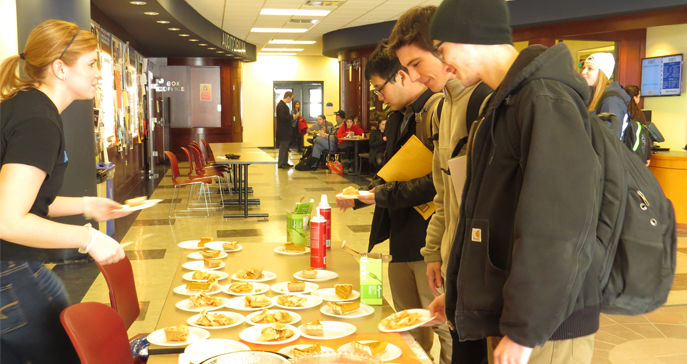
Penn State Behrend students celebrate Pi Day early.
Pi Day — a day to celebrate one of the most well-known principles in mathematics — may fall during spring break, but the Penn State Behrend Math Club still found a way to celebrate it.
“I’ve always wished we could do something to celebrate Pi Day here at Behrend, but the date always fell during spring break,” said Lisa Giancola, a junior mathematics major and president of the Math Club.
But Giancola and her fellow club members didn't let this year’s “Pi Day of the Century” — March 14, 2015 — go by without a little fanfare. They simply subtracted a week and a day and celebrated Pi Day on Friday, March 6, by handing out 240 slices of pie outside of Bruno’s student cafe.
However you figure it, Giancola said the Math Club considered the event a success. “We’d like to expand it next year and distribute pie in the science and engineering buildings, too, since they use pi in their classes every day.”
Adam Combs, lecturer in mathematics and Math Club adviser, talked about Pi, "Pi Day of the Century" and mathematics in general.
Q: What is Pi and why is it significant in math?
Combs: We all learn the number Pi, 3.1415… is significant in math when it comes to circles in geometry. It is related to both the area and circumference of a circle. From this, and something called the “unit circle,” it also is very prevalent in trigonometry, and hence calculus, and hence differential equations, and hence…the list goes on. So, there is so much importance from just one shape, the circle.
Q: This year’s actual Pi day (3.14.15) is particularly significant, right? Mathematicians must love that!
Combs: People who love math always get excited when something uniquely mathematical happens in daily life. This occurrence of having the date read 3/14/15 which is the first 5 digits of Pi — 3.1415 — in order, happens once in a century.
Q: Why do you love math?
Combs: Not to wax philosophic, but I think Galileo said it best when he said, “Mathematics is the language in which God has written the universe.” The belief in a higher being aside, everything in the way our physical world works has some kind of relationship to math. The sense of wonder this inspires is why I love math.
Q: Why do you think some people hate math?
Combs: Some people unfortunately do not get to see how interesting, and useful, math can really be. Some people who may have struggled with math in the past may also be a little afraid of math. This is natural, but I think the faculty members here at Behrend are really great at helping with that.
Q: Do you believe that anyone can learn to be good at math?
Combs: Do you want to know what my worst subject was in high school? Math! I hated it because I was afraid of it. I thought I couldn’t do it, and waited until my sophomore year in college to actually take my first college math class.
Then, I found that the teachers I had were willing to take the extra time to help me understand it. Once I started to understand it, the fear went away. Of course, I also worked very hard at it, too. Believe it or not, I am not one of those people who was born with an inherently mathematical brain. So, if I can do it with some help and hard work, I believe that anyone can.
Q: Favorite math joke?
Combs: This is so hard, because there are so many.
What did one math book say to the other?
Don’t bother me. I’ve got my own problems!